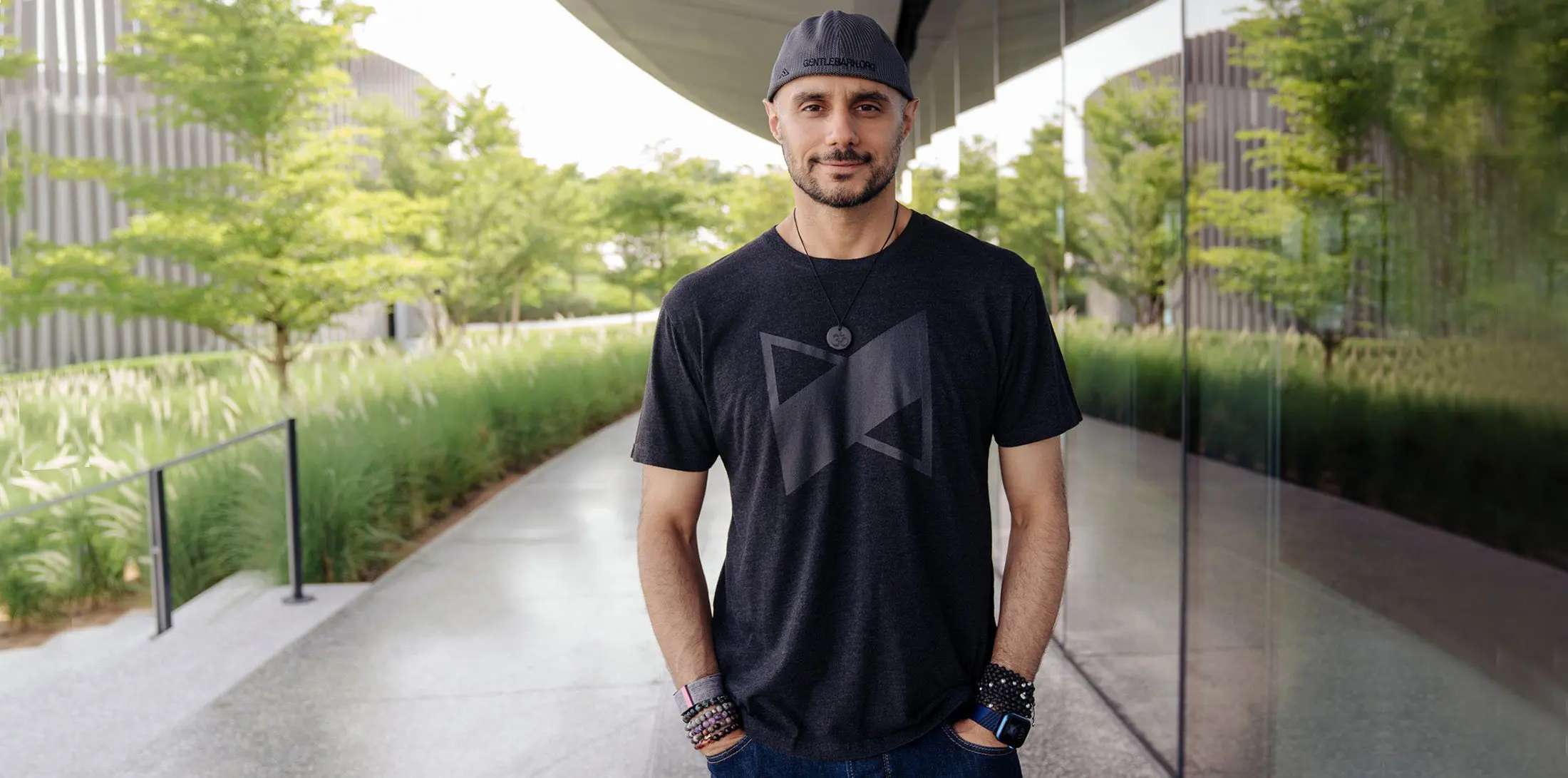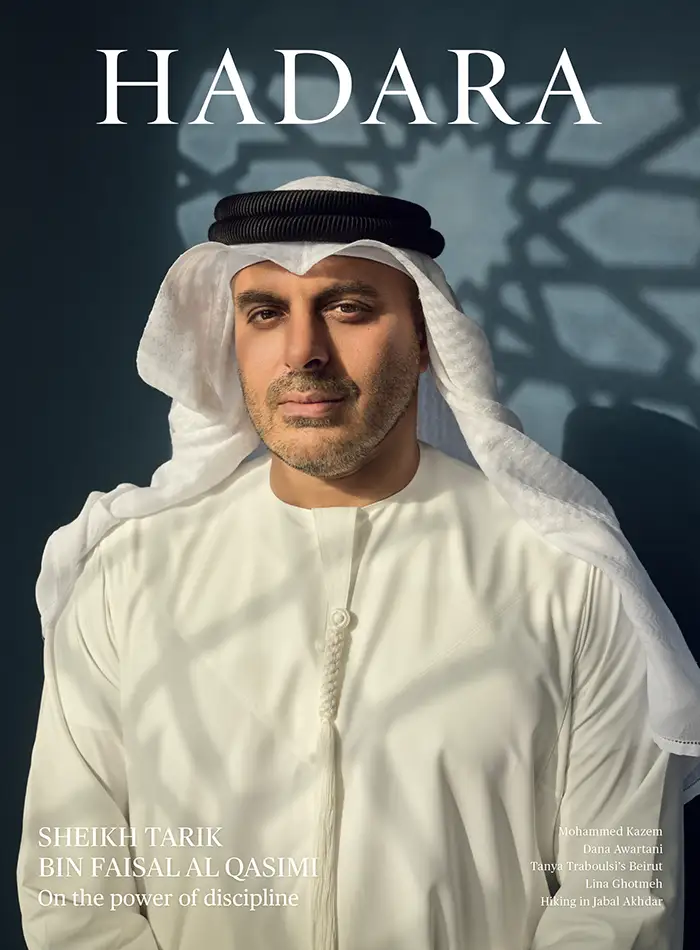HRH PRINCE KHALED BIN ALWALEED BIN TALAL AL SAUD
The Prince is invested—quite literally—in making life more sustainable, enjoyable and meaningful. His personal awakening opened his eyes to the opportunity to back businesses that promise real-world benefits. He seeks to foster change, through investment and example.
By Catherine Mazy
Photography By Anna Nielsen
HRH Prince Khaled bin Alwaleed bin Talal Al Saud has many irons in the fire. He is founder and CEO of KBW Ventures, a venture capital firm focused on backing good solutions across various industries, including green technologies like carbon capture and the future of food, fintech, and more. He is vice chairman of Arada, which develops residential communities in the UAE. He’s president of the Saudi Sports for All Federation, mandated by Vision 2030 to have all of Saudi society, not just Saudi nationals, physically active by 2030. Mainly based in Riyadh, Prince Khaled also spends time in Dubai and the US for work. He’s also a devoted advocate for health and the environment, which led him on a journey to veganism. The interests are diverse, yet they share a cohesive ethos of caring.
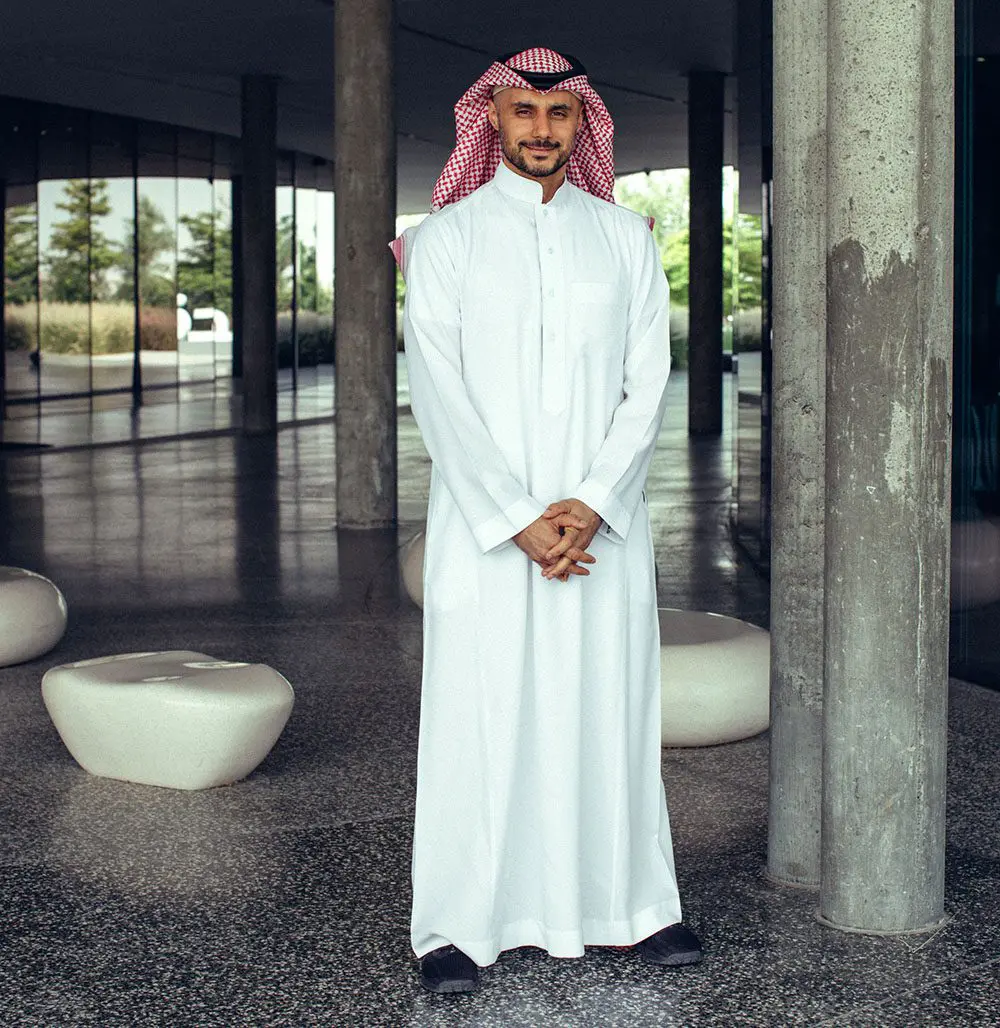
How would you describe yourself?
Passionate about work, passionate about what I do, passionate about this planet, passionate about learning from people who share the same concerns that I have—the well-being of the human race and animals. I’m optimistic that the future is bright, so I think a big part of my personality centres around being positive and finding solutions.
You grew up with fabulous wealth and used to have a collection of luxury cars. How did you switch to a less consumerist lifestyle?
I can answer that two ways—surface and deeper level. From a surface level, I’d rather do more with my money than just buy expensive things that depreciate in value as soon as you drive it off the dealership lot. Second, I found out that I can fulfil my life with more meaningful things rather than material things. That said, I do have my vices. For instance, I change phones regularly because I like to experiment with the latest technology, to be on the cutting edge especially in communication. I pass the devices on of course, so nothing goes to waste.
If I want to address this from a deeper perspective, I found out that owning material objects, just accumulating “stuff”, does not enhance anything in my life. Actually, it just decreases my attention and focus on what truly matters. Owning cars and luxury stuff—it’s just owning stuff. I have two Teslas—I guess that can be considered lavish—but one is in the Middle East where I am based, and one is in California as I’m there so frequently for work.
I feel at peace having less “stuff”. I’ve changed a lot over the past two years, I focus on myself a lot more now with exercising more, meditating, sleeping more. I like having minimal “things”. My family, my health, my well-being are all so much more my focus.
Another thing here is social media—people are told that buying more is better. They were told this before social and now that message has been amplified exponentially.
What was your “aha” moment?
I’d rather spend my decision-making abilities on how to improve my life and improve the status quo in general than focus on material things. This shift has been a 10-year transformation. It kind of started in 2012 and then over the past two years really revved up.
I’m a Real Madrid fan, and in the 2014 Champions League final against Atlético de Madrid, it was 1-0 until the 93rd minute. We equalised. I felt so invested in this, as you can see by my use of “we”. When we tied, I went crazy, I went nuts, I was jumping up and down. Not 15 minutes later, we scored a few more goals and won the championship. I was ecstatic, I was on top of the world, it felt amazing—you have no idea. Back then, I was going through some stuff; the next day I woke up and I looked at my life and nothing had changed. All the issues were still there. It hit me then, and I think this can be called my “Aha Moment”: I was burning all this energy, investing so much of myself, on a team—they didn’t even know I was alive. I decided then and there I wasn’t going to watch soccer anymore; no more energy and emotion on soccer, period. I was going to re-focus that energy on what does matter. These days, if Real Madrid wins, or Hilal for that matter, it’s nice for two minutes and then I move on.
What was your adolescence like?
I think mindfulness came too late; easy to say in hindsight. My adolescence was very privileged, very lucky. I got to be the son of Alwaleed bin Talal and Dalal bint Saud. It is one of the biggest blessings I have had in my life. In the past few years, I have learned not to take it for granted. It is a big responsibility that I appreciate every day.
I was a happy child. I was very lucky to have seen my parents spend a long time together. I loved technology even then, I used to take computers apart and put them back together. I wrote MS-DOS code all the time, I played video games. I played soccer growing up, we had a neighbourhood league and it kept growing.
My dad was never conventional, so it always struck me as good to be different. So I found my separate interests that I didn’t share with many people as a special thing, a positive thing. I grew up knowing it was OK to be yourself. This is the example set by both of my parents, and I respect that.
“My dad was never conventional, so it always struck me as good to be different. So I found my separate interests that I didn’t share with many people as a special thing, a positive thing.”
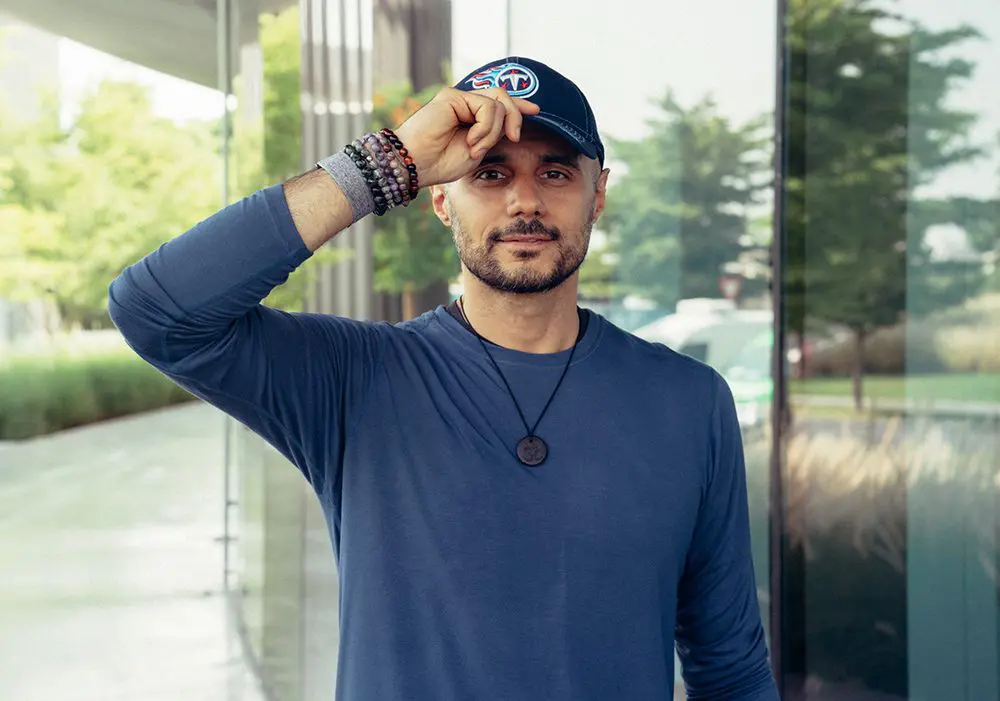
Veganism seems to be a core principle in your life. How did you go about switching toward a plant-based diet?
Look, people need to change their habits to better their health, and I’m no exception. Putting plant-based food aside for a moment, let’s look at adopting a new workout plan. One day you decide that you are out of shape, so you start walking, then you start walking more, and then it becomes easy to clear five kilometres a day. This is what happened with me with healthy eating—a sprint becomes a marathon.
I started by reducing junk food. Then I was mostly pescatarian, and gradually I phased out seafood. Basically I liked feeling trimmer, lighter, and looking more fit. Even my sleep quality improved. That was streamlining my nutrition plan to plant-based.
Veganism is a different thing as it is about a moral stance around not harming living beings—animals, even insects. Once you are learning about nutrition, it’s pretty unavoidable to start learning about factory farming and the conditions that animals are subjected to. That’s really what influenced me going from plant-based health-oriented to vegan.
I was never big into eggs like some people are so that wasn’t a big deal. That said, for the cheese and dairy crowd, KBW Ventures has invested in a few rounds in TurtleTree. They make cell-based milk, because dairy is a majorly big deal to most people, and vegans so often say the thing they miss most is cheese.
This global addiction to dairy also fuelled our investment in Eclipse Foods, known for its plant-based milk-replacement ice cream, and they have cheeses and more dairy products in the pipeline as well. One of the most important factors that influenced my investment was that milk-replacement technology used by Eclipse meets the needs of those with intolerances, a huge under-serviced market.
When did the realisation hit you on animal rights, food security and
environmental issues?
There is a domino type of situation here—a follow-on knowledge roll. First, it’s health, and then you begin understanding the environmental implications of your improved choices. Then from environmental awareness, you start seeing that many of your choices can be improved and it’s a cascade effect.
I went from eating healthier to caring about animal welfare and how our food system works, to choosing faux leather for my personal vehicles and clothing and so on. Then it just made sense to continue building on that with everything. It was cost effective as well—for the naysayers out there, do try price comparisons.
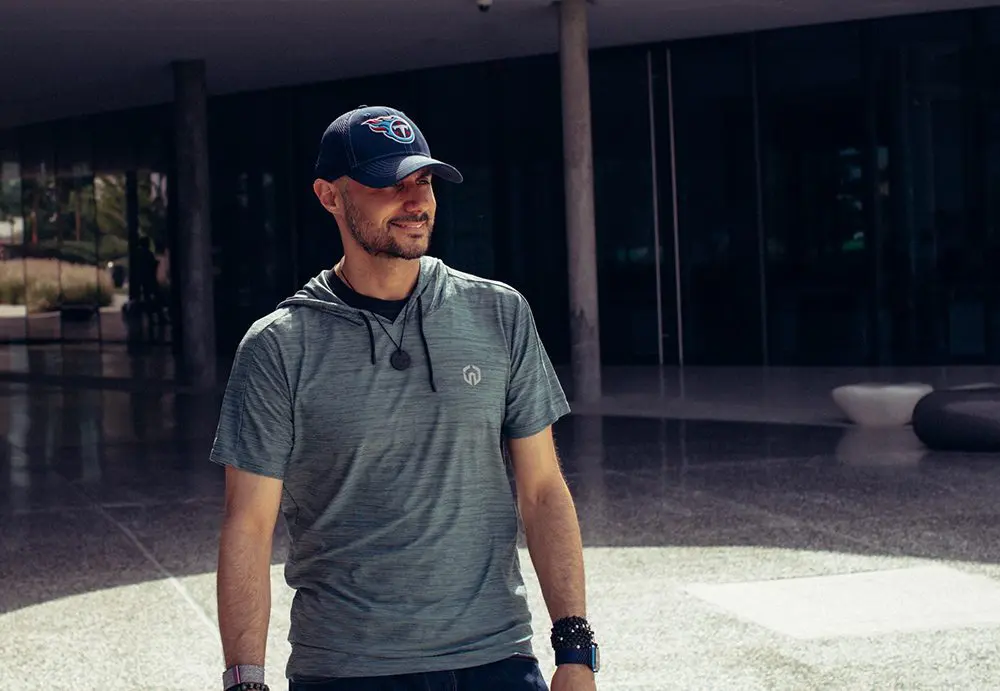
Are any of your investments through KBW aimed at getting plant-based eating to the masses?
First I will address the idea that eating plant-based is out of the budgets of most people. Logically speaking, it isn’t. Lentils and chickpeas and all types of beans and so many other plant proteins are very affordable, very healthy, and very filling. Eating trendy food and fast food—vegan or non-vegan—will always be more expensive than eating whole natural pulses, vegetables, and legumes. So, if you want to eat a burger—vegan or non—you’re going to pay more than what a bag of beans or lentils would cost, and that’s anywhere in the world.
In terms of KBW Ventures and our investments, we have most recently closed a very exciting deal with Eclipse Foods. We joined the company’s Series B round of more than $40 million, co-investing alongside really great VCs. This is our latest move to make the foods that people love more widely available in sustainable versions. Eclipse’s proprietary technology and methods allow for consumers to get delicious and creamy ice cream with no factory farming whatsoever.
In blind taste tests, 73% of people said Eclipse chocolate ice cream is creamier than the US’s best-selling dairy chocolate ice cream. Many of our other food tech investments have similar success rates in consumer taste tests. In the KBW Ventures portfolio we’ve got products that are already in the market with loyal customers, like Eclipse, and then we have several that are yet to be available to the consumer—cell cultivated.
You are president of the Saudi Sports for All Federation (SFA). Fitness is a big issue in the Gulf—15% of adults in Saudi Arabia and the UAE have diabetes; it’s closer to 20% in Bahrain, Kuwait and Qatar. How do you get others on board?
SFA is run by a very capable team who have developed incredibly creative ways to incentivise participation in physical activity. Over the past few years, we have launched programmes that address all fitness levels and capabilities. If you’re the person who can’t manage a squat, we’ve got other ways to get you moving. SFA has gamified a lot of our activations—this has proven very popular. Our app also has a social element, allowing community sports groups to create events that people from all over the country can access and sign up for.
Based on population surveys, there has been a marked growth in those that are now physically active. Some initiatives, like programmes for children in schools and women-centric gym licensing, have contributed to the big uptake in sports participation in Saudi.
“I went from eating healthier to caring about animal welfare and how our food system works, to choosing faux leather for my personal vehicles and clothing and so on.”
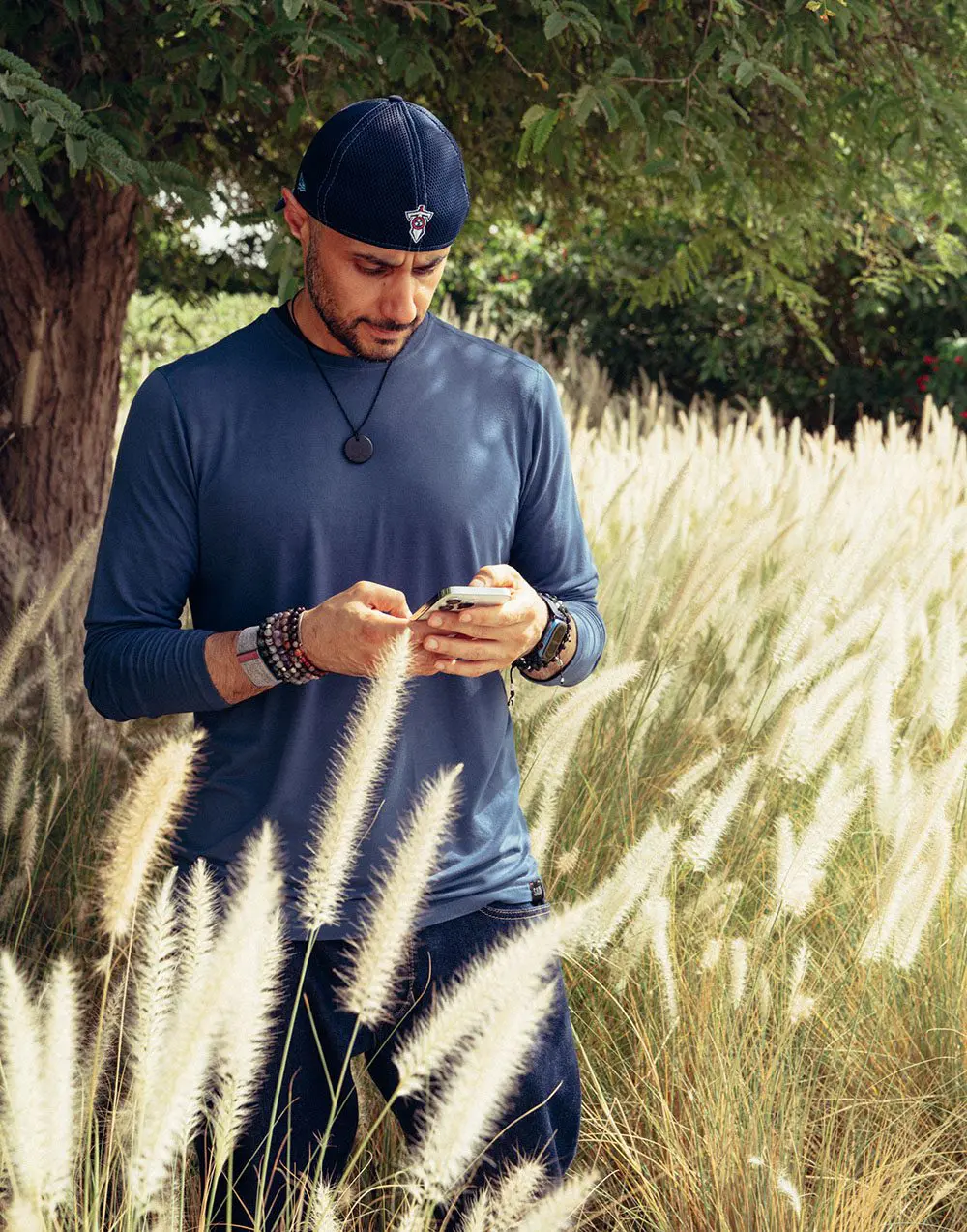
Of the top 10 countries by CO2 emissions per capita, half are in the Gulf. Are enough Middle Eastern entrepreneurs addressing real-world problems?
Entrepreneurship is one of the fastest-growing trends in the wider Middle East. There are a few startups working in sustainable spaces—agtech, like vertical farming, is one example–but I haven’t seen many in the way of much-needed models like carbon capture. I’d love to see more green tech business come out of our region instead of the next food-delivery service. There are more useless companies out there than there are useful, that’s the truth of it—and by useless I mean of no benefit to the world.
For the Middle East, right now we need to continue incentivising entrepreneurship and having our support mechanisms in place and growth channels like Monsha’at [in Saudi]. Local VCs are playing a very important role as they are the main source of funding for most of the promising startups in the region.
Can you tell us about your involvement in Arada?
The idea for Arada came about after a conversation with now-chairman, Sheikh Sultan bin Ahmed Al Qasimi, and the thinking behind it was very simple. We aimed to fill the huge market gap in Sharjah for well-designed homes, surrounded by great facilities, at a competitive price point. The incredible results we’ve seen—10,000 homes sold and 2,600 of those completed—in just five years has shown that our value proposition is solid and resonates with people. Going forward, we have even bigger plans for Arada. We’re launching our first community in Dubai, where we have aggressive expansion plans, this year and then we’ll be looking to Saudi Arabia and other international locations, too.
One aspect of Arada’s business that resonates with me personally is Wellfit. Although it is only a few months old, Wellfit has already gained a loyal membership due to a number of key differentiators that make it stand out in what is a pretty crowded marketplace. The main factor has been the seamless use of technology—that for me is a big one—allowing gym-goers to track their performance in a number of different ways using one centralised app.
How do business and development need to change to respond to climate change and environmental needs?
I think we’re rapidly reaching a point where companies stop seeing proactive action on sustainability and climate change issues as just a tick-box exercise to fulfil ESG [environmental, social and governance] requirements or to make themselves look good in front of the media.
At Arada we’re in the process of taking some pretty drastic action on this issue, which will make us a global leader in this area, and we’ll be making an announcement to that effect later on this year. So why are we doing this? Yes, it’s good for the environment and it’s good for governance and so on, but from a hard numbers perspective it’s also just good business. We can’t afford not to do this. And I think any company that has any kind of a long-term plan also has to factor in this kind of approach because a time is rapidly coming when those who don’t do this will see a significant negative impact on their bottom line.

